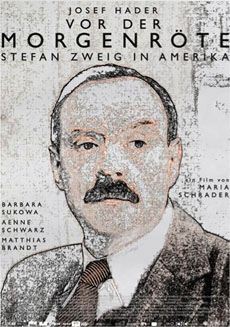![]()
Austria | Germany | France 2016
Opening June 2, 2016
Directed by: Maria Schrader
Writing credits: Maria Schrader, Jan Schomburg
Principle actors:Josef Hader, Barbara Sukowa, Aenne Schwarz
 Actress-director Maria Schrader has made a sensitive portrait of the famous author Stefan Zweig during his years of exile from the Nazis. An intelligent reflection on migration, banishment, and the role of the intellectual in society, it’s a historical film with urgent questions for the present.
Actress-director Maria Schrader has made a sensitive portrait of the famous author Stefan Zweig during his years of exile from the Nazis. An intelligent reflection on migration, banishment, and the role of the intellectual in society, it’s a historical film with urgent questions for the present.
Cosmopolitan Austrian author Stefan Zweig was a confirmed pacifist and a star in his day. Along with Thomas Mann, he was the most-translated German-speaking novelist. Farewell to Europe describes the terrible break in Zweig’s life and work when he was compelled to leave his country. Such displacement was particularly agitating for writers, whose sensibilities and livelihoods were much more firmly anchored in the language they were forced to leave behind than were other refugees. Distracted, and emotionally and financially deployed by his wanderings, he and his second young wife Lotte (the excellent Aenne Schwarz) end up in exile in Brazil.
Maria Schrader’s opulent film shows the famous author in six of his life’s episodes. These include his participation in the P.E.N. congress in Buenos Aires in 1936, his 1941 visit in New York to his first wife Friderike (Sukowa), and his end in Petropolis, Brazil, in 1942. It was in Petropolis that Zweig wrote perhaps his most famous work Chess Story / The Royal Game, set against the brutality of the fascist regime. In the main role, Josef Hader, otherwise known for his cabaret acts, is convincing as the sensitive author. Zweig’s inner struggle for the “right attitude” toward the unimaginable events in his beloved homeland is mirrored in the increasingly oppressive atmosphere of his adopted home. Farewell to Europe is one of the finest films of the year. (
